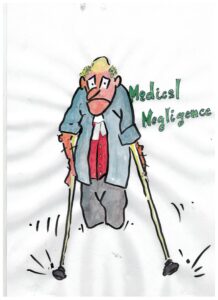Consumer/barrister relationship clarified by ACCC and NSW Bar Association
- 2021-05-01
- By Dr Will Higgs PhD, Barrister
- Posted in common law
7 August 2003
Consumers in New South Wales have the option of seeking to directly brief barristers when seeking legal representation, the Australian Competition and Consumer Commission and the NSW Bar Association have agreed.
“Such direct access may make a barrister’s service more affordable for more consumers”, ACCC Chairman, Mr Graeme Samuel said today. “Contrary to a misapprehension, the NSW Barristers Rules do not require that clients brief barristers through a solicitor.
“Under the NSW rules, barristers can accept ‘direct access briefs’ from clients without the need for the clients to engage a solicitor, if the barrister so chooses.
“The NSW Bar Association agrees that it could not take any disciplinary action against a barrister accepting a direct access brief simply for choosing to do so.
“The ACCC notes, however, that it is not a requirement of the rules that barristers must accept such briefs. Many barristers will make the individual choice to be briefed through a solicitor.
“The availability of choice for all parties is an important factor. The option to directly brief a barrister and the ability of the barrister to accept the brief provides choice to all parties. It is likely to result in more efficiency, competition and consumer benefits.
“This clarification of the rules enhances competition in the market for barristers’ services.
“It also provides the opportunity for reduced costs for consumers as it will not be necessary to employ two professionals for specialist advice or advocacy services. In some cases, briefing through a solicitor may cause duplication of work and increased costs”.
NSW Bar Association President, Mr Bret Walker SC, said it was important that barristers in NSW were under no misapprehension as to the requirements of the NSW Barristers’ Rules.
“There is nothing in the NSW Barristers’ Rules preventing them from accepting direct access briefs. It is a matter for their and prospective clients’ choice”.
The ACCC will continue to examine the rules of professional associations from a competition perspective as part of its role in achieving compliance with the Trade Practices Act 1974 and the State Competition Codes.
Release number: MR 164/03
SEARCH BLOG POSTS
LATEST BLOG POSTS
- Updated product safety mandatory reporting guidance for suppliers now available
- Pleading fraud – cause and effect is essential
- Does the Trustee’s right of indemnity have priority over the right of beneficiaries in relation to assets?
- Rules of war (in a nutshell) | The Laws Of War
- MH370 Final Report
Past Blog Posts
- December 2021
- September 2021
- August 2021
- May 2021
- April 2021
- March 2021
- August 2020
- February 2020
- September 2019
- February 2019
- December 2018
- July 2018
- April 2018
- December 2017
- May 2017
- February 2017
- December 2016
- November 2016
- October 2016
- September 2016
- August 2016
- April 2016
- March 2016
- October 2015
- September 2015
- August 2015
- May 2014
- April 2014
- March 2014
- January 2014
Categories
- Appeals
- Artificial Intelligence
- Aviation law
- Banking and Finance Law
- Blogs
- Civil Liability Act
- Class Actions
- Coding for lawyers
- common law
- Consumer Claims (TPA)
- Contract Law
- Contractual Interpretation
- Criminal law
- Deeds
- Docassemble
- duty of care
- Engineering Law
- Equity
- Evidence
- Exclusion Clauses
- Execution of documents
- Expert Witness
- featured
- Financial Services
- Fraud
- Fundraising (Chapter 6D)
- General comment
- Home Building Law
- Insurance
- Legal drafting
- Local Court
- Medical Negligence
- MH370
- Motor Accidents
- Negligence
- Occupiers negligence
- Other
- Personal Injury
- Personal Property Securities (PPSA)
- Pleading
- Practice & Procedure
- Products Liability
- Property
- Real Property
- Reasons for a decision
- Securitisation
- Security (Mortgages & Charges)
- Sentencing
- Swaps & Derivatives
- Teaching
- Transactional Law
- Transfer of financial assets in transactions
- Trusts & Trustee Law
- Uncategorized
- War and Weaponry
- Witnesses
SEARCH BLOG POSTS
LATEST BLOG POSTS
- Updated product safety mandatory reporting guidance for suppliers now available
- Pleading fraud – cause and effect is essential
- Does the Trustee’s right of indemnity have priority over the right of beneficiaries in relation to assets?
- Rules of war (in a nutshell) | The Laws Of War
- MH370 Final Report
Past Blog Posts
- December 2021
- September 2021
- August 2021
- May 2021
- April 2021
- March 2021
- August 2020
- February 2020
- September 2019
- February 2019
- December 2018
- July 2018
- April 2018
- December 2017
- May 2017
- February 2017
- December 2016
- November 2016
- October 2016
- September 2016
- August 2016
- April 2016
- March 2016
- October 2015
- September 2015
- August 2015
- May 2014
- April 2014
- March 2014
- January 2014
Categories
- Appeals
- Artificial Intelligence
- Aviation law
- Banking and Finance Law
- Blogs
- Civil Liability Act
- Class Actions
- Coding for lawyers
- common law
- Consumer Claims (TPA)
- Contract Law
- Contractual Interpretation
- Criminal law
- Deeds
- Docassemble
- duty of care
- Engineering Law
- Equity
- Evidence
- Exclusion Clauses
- Execution of documents
- Expert Witness
- featured
- Financial Services
- Fraud
- Fundraising (Chapter 6D)
- General comment
- Home Building Law
- Insurance
- Legal drafting
- Local Court
- Medical Negligence
- MH370
- Motor Accidents
- Negligence
- Occupiers negligence
- Other
- Personal Injury
- Personal Property Securities (PPSA)
- Pleading
- Practice & Procedure
- Products Liability
- Property
- Real Property
- Reasons for a decision
- Securitisation
- Security (Mortgages & Charges)
- Sentencing
- Swaps & Derivatives
- Teaching
- Transactional Law
- Transfer of financial assets in transactions
- Trusts & Trustee Law
- Uncategorized
- War and Weaponry
- Witnesses




